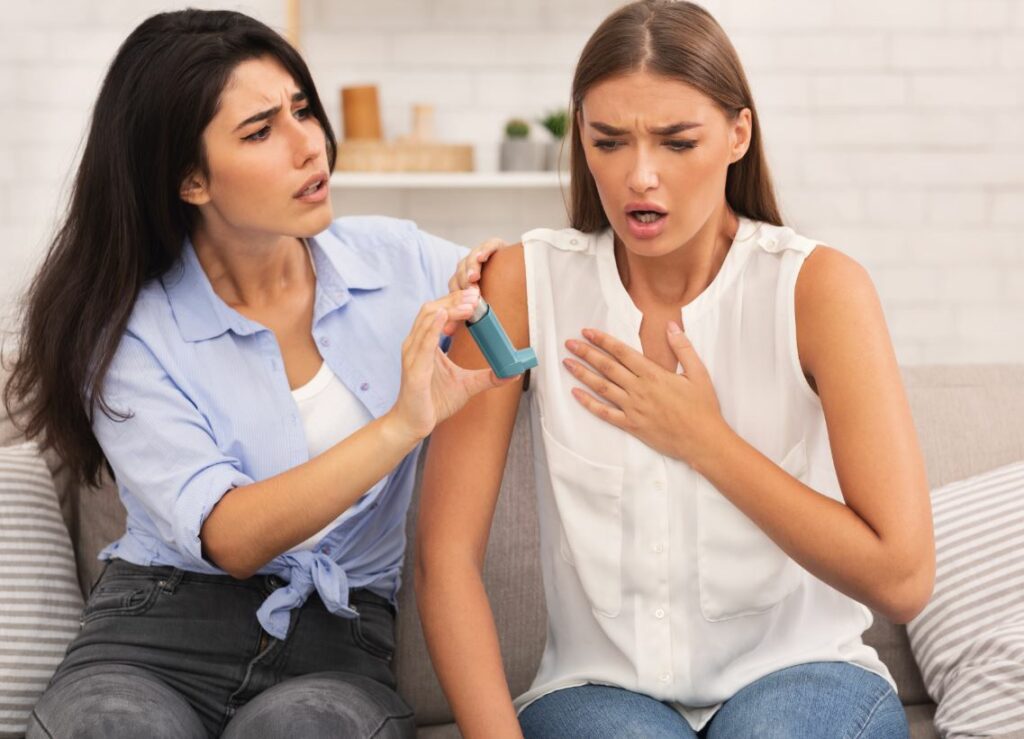Covid-19 is a global viral pandemic affecting our communities. It is an infectious disease that primarily affects the respiratory system. If you have symptoms of asthma and get coronavirus infection, you are at high risk of developing pneumonia, asthma attack, and other serious lung diseases.
What Is Asthma
Asthma is defined as a chronic condition characterized by inflammation and narrowing of the airways. As airways get swollen and produce extra mucus, it results in coughing, difficulty in breathing, shortness of breath, and wheezing respiration.
What Are The Symptoms Of Asthma?
The symptoms of asthma vary from one person to other. In some people, asthma is not more than a minor nuisance. In others, it can be life threatening. Some asthma patients have infrequent attacks and experience the symptoms only at certain times. In contrast, others have asthma symptoms that interfere with their every activity and affect their life quality.
The symptoms of asthma include:

- Difficulty in breathing
- Shortness of breath
- Chest tightness
- Pain in chest
- Wheezing respiration
- Coughing
- Difficulty in sleeping
If asthma symptoms become bothersome and frequent, it is probably a sign of worsening. A severe asthma attack can be life threatening and requires emergency treatment.
How Is Covid-19 Dangerous For People With Asthma?
Asthma is a chronic disease condition that compromises the body’s immune system and respiratory tract. Not much is known about the impact of coronavirus on asthmatic patients. A study shows that if you have asthma, it does not increase your chances of getting infected with the SARS – CoV-2 virus that causes covid-19. Still, if symptoms of asthma comorbid with coronavirus, the disease tends to become more severe.
Both Covid-19 infection and asthma share warning symptoms such as difficulty in breathing, chest tightness, and coughing. Our post aims to help you identify and differentiate the symptoms of asthma and covid-19 so that you can communicate with your doctor and reduce the risk of emergency care.
Symptoms Of Covid-19

The common symptoms of coronavirus infection includes:
- A dry cough
- Fever
- Loss of appetite
- Body aches
- Headache
- Fatigue
- Shortness of breath
- Loss of taste or smell
- A sore throat
- Congestion
- Nausea or vomiting
- Diarrhoea
- A runny nose
Usually, there is an inducer such as an allergen with asthma. With covid-19, there is no inducer. If your asthma attack is short, sporadic and the symptoms such as wheezing, respiration, and shortness of breath are controlled with asthma medicine, you likely to have asthma and not coronavirus infection.
If you have asthma and contracts covid-19 you should look for additional symptoms such as:
- Chest tightness
- Breathlessness
- Increase in wheezing
- Early morning or night time coughing
- Frequent use of inhaler
What To Do If You Have Symptoms Of Asthma And Covid-19
If you have asthma and develop, covid-19 symptoms or get signs of cold or other respiratory issues, call your doctor. As Covid-19 affects the upper as well as lower airways, it may lead to pneumonia, asthma attack or acute respiratory diseases. The sooner you reach the doctor, the sooner your condition is identified and treated before it becomes severe.
Seek emergency help if:
- Your asthma medicines are not helping
- You are having a hard time breathing
- Shortness of breath makes it difficult to talk
- Chest pressure or pain
- Confusion
- Face or lips turn blue
How To Be Proactive About Your Lung Health?
During the coronavirus pandemic, the wisest thing to do is to take extra precautions and care. Apart from following the covid-19 protocol such as wearing a mask, maintaining social distance, avoid touching eyes, nose and mouth, avoiding crowded places, surface sanitization and washing your hands frequently, you need to take additional measures. Follow the asthma Action Plan advised by CDC that includes:
- People with comorbidities such as asthma are pre-qualified for covid-19 testing. Make sure not to get tested at a crowded place or without cross ventilation.
- Continue the asthma medication as usual. Have a good supply of your medicine and know the correct way to use inhaler. Controlling asthma symptoms is essential during the pandemic. There is no evidence to suggest if the asthma medication worsens the covid-19 outcome or increase the risk of acquiring coronavirus infection.
- Avoiding asthma triggers such as pol Pollen, dust mites, tobacco smoke, pet, weather extremes, mold, acid reflux, air pollution, extreme exercise, strong fragrance, stress, food additives contain sulphites and alcohol.
- Improve your immunity healthy habits. Eat nutritious and well balanced diet rich in vitamin C, vitamin A, fibre, zinc, protein and iron. Practice meditation to reduce stress. Practice breathing exercises and yoga poses recommended by your health care provider to improve lung capacity. Take 7-8 hours sound sleep and maintain a healthy weight.
- Get vaccinated to avoid coronavirus infection to keep your condition under control.
If symptoms of asthma are well controlled, more chances are of achieving a good outcome after acquiring Covid-19. However, as Covid-19 is a new disease, research is constantly evolving. Soon, we will have more data to understand effect of coronavirus on asthma patients. Until then it is essential to monitor your health daily and follow the precautionary measures to stay safe.







